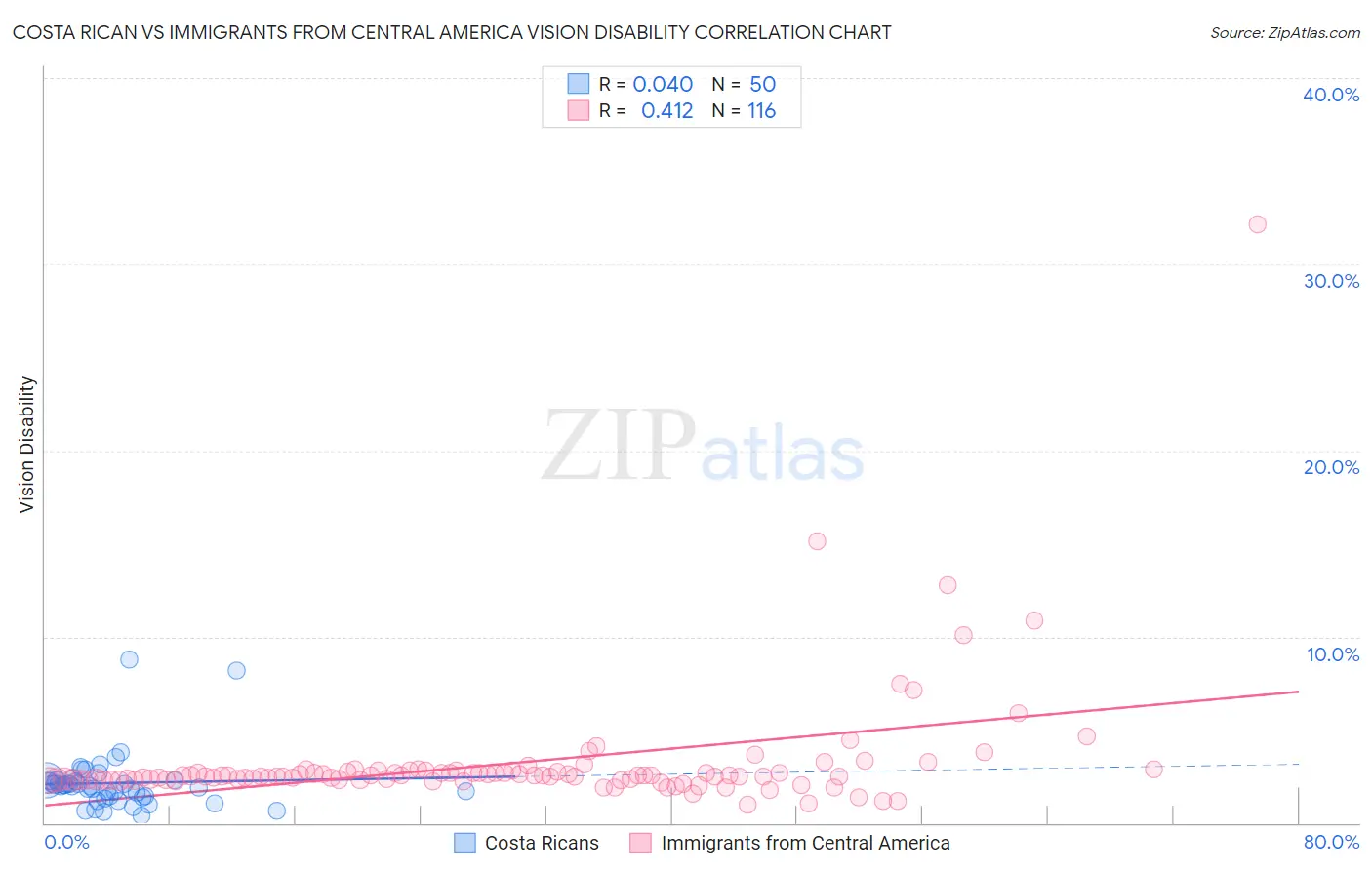Costa Rican vs Immigrants from Central America Vision Disability
COMPARE
Costa Rican
Immigrants from Central America
Vision Disability
Vision Disability Comparison
Costa Ricans
Immigrants from Central America
2.2%
VISION DISABILITY
40.7/ 100
METRIC RATING
182nd/ 347
METRIC RANK
2.5%
VISION DISABILITY
0.0/ 100
METRIC RATING
285th/ 347
METRIC RANK
Costa Rican vs Immigrants from Central America Vision Disability Correlation Chart
The statistical analysis conducted on geographies consisting of 253,497,093 people shows no correlation between the proportion of Costa Ricans and percentage of population with vision disability in the United States with a correlation coefficient (R) of 0.040 and weighted average of 2.2%. Similarly, the statistical analysis conducted on geographies consisting of 535,338,761 people shows a moderate positive correlation between the proportion of Immigrants from Central America and percentage of population with vision disability in the United States with a correlation coefficient (R) of 0.412 and weighted average of 2.5%, a difference of 13.1%.

Vision Disability Correlation Summary
| Measurement | Costa Rican | Immigrants from Central America |
| Minimum | 0.38% | 1.00% |
| Maximum | 8.8% | 32.1% |
| Range | 8.4% | 31.1% |
| Mean | 2.1% | 3.2% |
| Median | 2.0% | 2.5% |
| Interquartile 25% (IQ1) | 1.4% | 2.3% |
| Interquartile 75% (IQ3) | 2.3% | 2.7% |
| Interquartile Range (IQR) | 0.84% | 0.43% |
| Standard Deviation (Sample) | 1.5% | 3.4% |
| Standard Deviation (Population) | 1.5% | 3.4% |
Similar Demographics by Vision Disability
Demographics Similar to Costa Ricans by Vision Disability
In terms of vision disability, the demographic groups most similar to Costa Ricans are Immigrants from Western Europe (2.2%, a difference of 0.020%), Uruguayan (2.2%, a difference of 0.13%), Immigrants from Burma/Myanmar (2.2%, a difference of 0.19%), Immigrants from North America (2.2%, a difference of 0.24%), and Immigrants from Oceania (2.2%, a difference of 0.28%).
| Demographics | Rating | Rank | Vision Disability |
| Immigrants | Fiji | 47.6 /100 | #175 | Average 2.2% |
| Yugoslavians | 46.5 /100 | #176 | Average 2.2% |
| Slavs | 46.0 /100 | #177 | Average 2.2% |
| Immigrants | Oceania | 45.1 /100 | #178 | Average 2.2% |
| Immigrants | North America | 44.5 /100 | #179 | Average 2.2% |
| Uruguayans | 42.7 /100 | #180 | Average 2.2% |
| Immigrants | Western Europe | 41.1 /100 | #181 | Average 2.2% |
| Costa Ricans | 40.7 /100 | #182 | Average 2.2% |
| Immigrants | Burma/Myanmar | 37.9 /100 | #183 | Fair 2.2% |
| Moroccans | 35.4 /100 | #184 | Fair 2.2% |
| Immigrants | Middle Africa | 33.5 /100 | #185 | Fair 2.2% |
| Native Hawaiians | 33.3 /100 | #186 | Fair 2.2% |
| Immigrants | St. Vincent and the Grenadines | 30.3 /100 | #187 | Fair 2.2% |
| Guyanese | 28.9 /100 | #188 | Fair 2.2% |
| Salvadorans | 27.4 /100 | #189 | Fair 2.2% |
Demographics Similar to Immigrants from Central America by Vision Disability
In terms of vision disability, the demographic groups most similar to Immigrants from Central America are Yakama (2.5%, a difference of 0.010%), Sioux (2.5%, a difference of 0.010%), Honduran (2.5%, a difference of 0.15%), French American Indian (2.5%, a difference of 0.18%), and Puget Sound Salish (2.5%, a difference of 0.30%).
| Demographics | Rating | Rank | Vision Disability |
| Spanish | 0.0 /100 | #278 | Tragic 2.4% |
| Nepalese | 0.0 /100 | #279 | Tragic 2.4% |
| Cape Verdeans | 0.0 /100 | #280 | Tragic 2.4% |
| U.S. Virgin Islanders | 0.0 /100 | #281 | Tragic 2.5% |
| Immigrants | Caribbean | 0.0 /100 | #282 | Tragic 2.5% |
| Puget Sound Salish | 0.0 /100 | #283 | Tragic 2.5% |
| Yakama | 0.0 /100 | #284 | Tragic 2.5% |
| Immigrants | Central America | 0.0 /100 | #285 | Tragic 2.5% |
| Sioux | 0.0 /100 | #286 | Tragic 2.5% |
| Hondurans | 0.0 /100 | #287 | Tragic 2.5% |
| French American Indians | 0.0 /100 | #288 | Tragic 2.5% |
| Immigrants | Nonimmigrants | 0.0 /100 | #289 | Tragic 2.5% |
| Immigrants | Cuba | 0.0 /100 | #290 | Tragic 2.5% |
| Immigrants | Honduras | 0.0 /100 | #291 | Tragic 2.5% |
| Crow | 0.0 /100 | #292 | Tragic 2.5% |